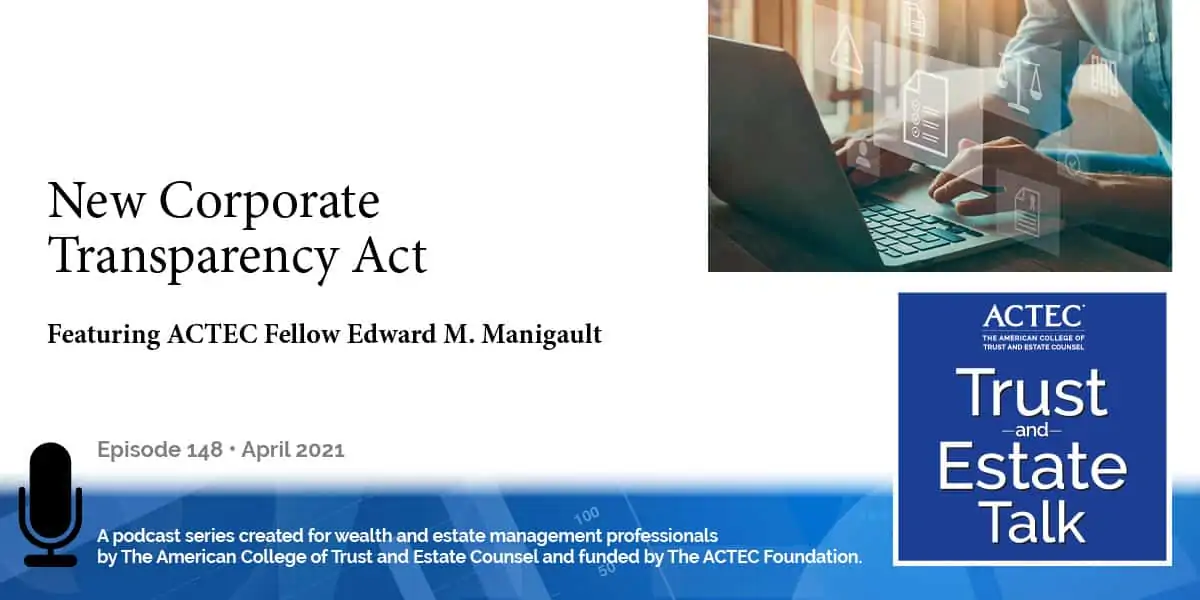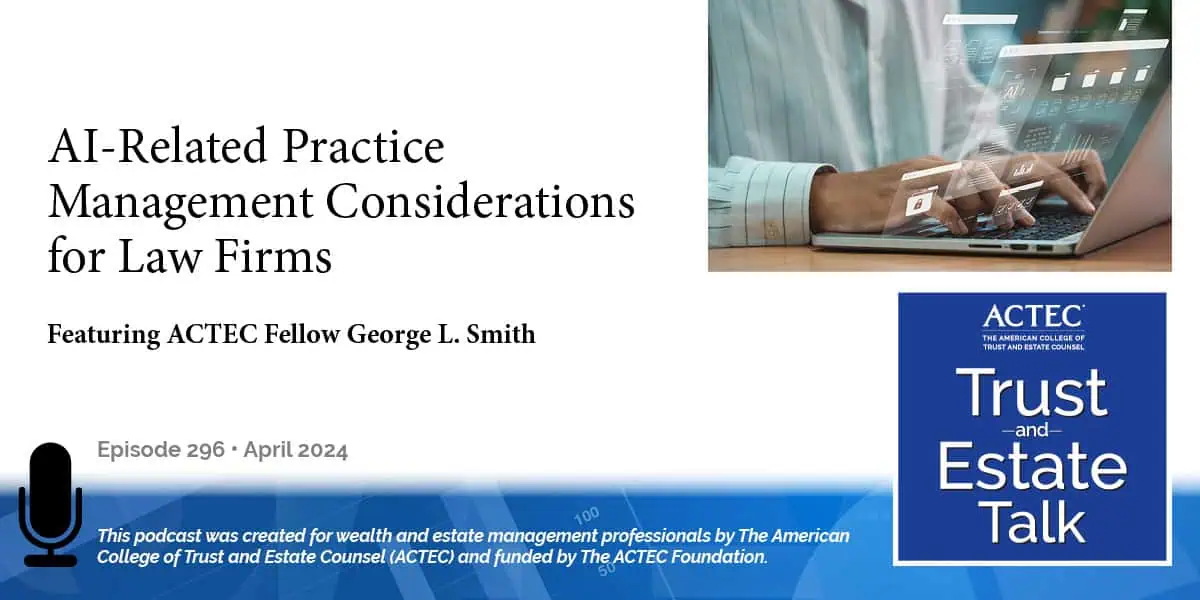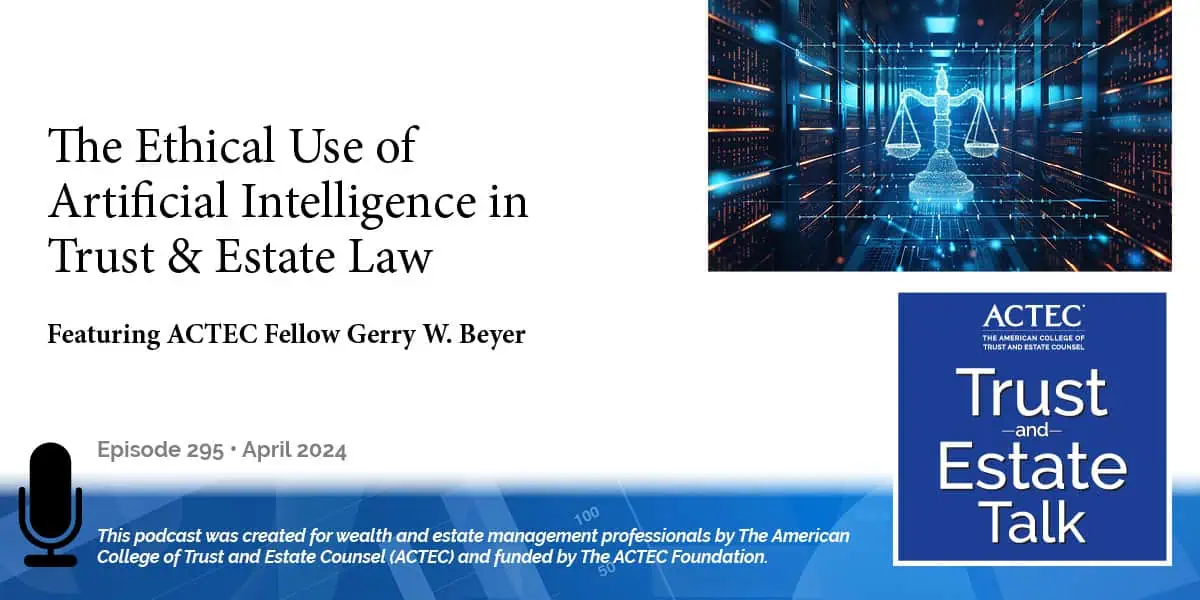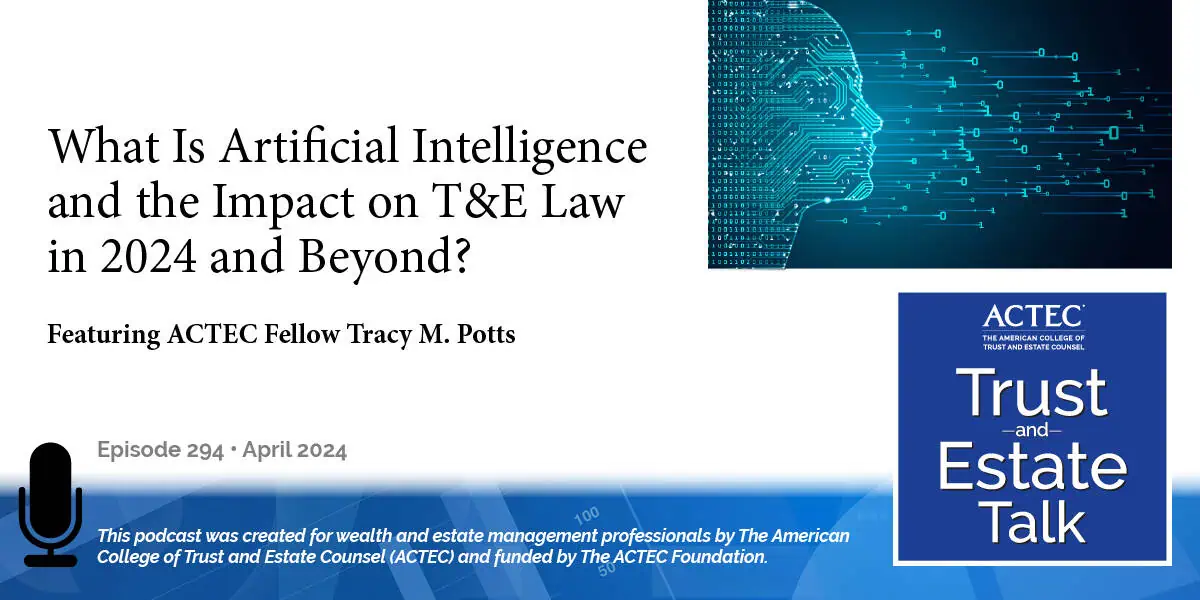New Corporate Transparency Act

“The New Corporate Transparency Act,” that’s the subject of today’s ACTEC Trust and Estate Talk.
Transcript/Show Notes
This is Doug Stanley, ACTEC Fellow from St. Louis, Missouri. The Corporate Transparency Act, or CTA, was enacted on January 1st, 2021 as part of the National Defense Authorization Act and effectively created a national beneficial ownership registry. To inform us on how this new federal law affects estate planners and their clients, you will be hearing today from Fellow Edward M. Manigault from Atlanta, Georgia. Welcome, Ed.
Thank you, Doug. The CTA requires certain business entities to report their beneficial owners and applicants to the Financial Crimes Enforcement Network, otherwise known as FinCEN, which is a bureau within the Department of Treasury. I’m going to cover the CTA at a high level, what’s required, including certain definitions, and then end with five important points that should be relevant to all Fellows and other estate planners.
It’s very important to be familiar with the law because the CTA includes both civil and criminal penalties for failing to comply with the reporting of requirements or for reporting false beneficial ownership information.
What’s in the Corporate Transparency Act (CTA)?
So, what’s covered under the CTA? First, we’ll start with reporting companies, the first definition that’s relevant. Under the terms of the CTA, corporations, LLCs and other ”similar entities” that are either created by the filing of a document with the Secretary of State or similar office under the law of a state or Indian tribe or formed under the law of a foreign country and registered to do business in the United States by the filing of a document with the Secretary of State or similar offices under the laws of a state or Indian tribe.
So, let me pause there. The first component is the entity. Clearly corporations and also LLCs are included, but there’s an open question as to what is meant by other similar entities. But those similar entities could include limited partnerships as an example because they’re typically created by filing a document with the Secretary of State.
The next definition that is important is the applicant. This will be especially important to lawyers who are listening to this podcast. Anyone who files an application to form a U.S. corporation, LLC, or again, other similar entity, or who registers a foreign corporation, LLC, or similar entity with the Secretary of State or similar office of a state, is considered an applicant. So, going back to what I started with at the beginning, the CTA requires a reporting company to report the applicant to FinCEN. In addition, the reporting company has to report the beneficial owners of the reporting company to FinCEN.
So the question is, what’s a beneficial owner? The definition is “any individual who directly or indirectly, through any contract, arrangement, understanding or relationship, exercises substantial control over the reporting company or owns or controls at least 25 percent of a reporting company.”
What does the reporting company have to report? So, in addition to applying, reporting the beneficial owner and the applicant, the information that has to be provided to FinCEN is the full legal name of the applicant and each beneficial owner, each of their dates of birth, their current address, which could be either home or work, and the final piece is what’s called a unique identification number. And that can be supplied by providing a valid state driver’s license, an unexpired passport, or if someone is from another country, the passport number from a foreign passport.
Takeaways from the CTA
There are five important takeaways.
Number 1, the good news. All of the requirements I’ve just listed are not yet effective. Notwithstanding that the CTA was passed on January 1st, 2021, the obligations under the CTA do not become effective until Treasury issues regulations pursuant to the statute. The statute requires those regulations to be issued by January 1st of 2022. It’s possible that they may come out earlier and it’s possible that the effective date under those regulations maybe come at a later date.
Number 2, and very important to Fellows and other estate planners, under the definition of reporting companies – remember I mentioned corporations, LLCs, and other similar entities that are created by filing something with the Secretary of State. That means the definition does not include common law trust. So, under the CTA, common law trusts are not considered reporting companies. Therefore, their beneficial owners and applicants are not required to be disclosed to FinCEN.
Number 3, lawyers will be impacted by this law in a couple of different ways. First of all, if a law firm is a corporation or an LLC, it will probably be considered a reporting company unless an exception applies. And I’ll come to an important exception in a moment. In that case, the law firm will be a reporting company and its beneficial owners and the applicant, which could be another lawyer who was the one who filed the application to create the entity, would need to be disclosed to FinCEN.
In addition, as I just mentioned, “applicant” is the person who files an application to create a reporting company. In many law firms, that is a role undertaken by the lawyer. It remains to be determined under what circumstance there might be exceptions, or whether files is limited to the person who signs, for example, in articles of incorporation, or if it’s broader than that.
In addition, lawyers may need to draft certain governing instruments for LLCs and corporations to take into account obligations under the CTA, including to provide the right information to the entity so they can report to FinCEN.
Two more important points. Number 4, the database is not public. So again, remember the information that has to be supplied. Full legal name, date of birth, address, and driver’s license or passport number. This information is held by FinCEN, can be shared with certain government organizations under limited circumstances, but is not available to the public, which is an important distinction compared to some of these rules in other countries.
Exceptions to Corporate Transparency Act
Finally, I promised an exception. There are two that I think are relevant to fellows and estate planners. Number 1, any entity, corporation, LLCs, or other similar entity that would otherwise be a reporting company, one exception applies if it has an operating presence at a physical office within the U.S. with over 20 full-time employees in the U.S. that filed, in the previous year, federal income tax returns in the U.S. demonstrating more than $5 million in gross receipts or sales. That company would not be considered a reporting company and would be exempt.
Number 2, there is a list of certain tax-exempt organizations which are not considered reporting companies. Those that are exempt from tax under 501 and 501(a), 527(a) or 4947(a). So, split-interest trusts, private foundations are going to be exempted and not considered reporting companies.
So, in conclusion, the law is not yet effective. There are some important points that lawyers need to know, both for themselves and for clients. And more information will be forthcoming when the regulations are proposed and then finalized, hopefully putting some clarity with respect to some of these definitions.
Thank you, Ed, for your insights on the Corporate Transparency Act.
This podcast was produced by The American College of Trust and Estate Counsel, ACTEC. Listeners, including professionals, should under no circumstances rely upon this information as a substitute for their own research or for obtaining specific legal or tax advice from their own counsel. The material in this podcast is for information purposes only and is not intended to and should not be treated as legal advice or tax advice. The views expressed are those of speakers as of the date noted and not necessarily those of ACTEC or any speaker’s employer or firm. The information, opinions, and recommendations presented in this Podcast are for general information only and any reliance on the information provided in this Podcast is done at your own risk. The entire contents and design of this Podcast, are the property of ACTEC, or used by ACTEC with permission, and are protected under U.S. and international copyright and trademark laws. Except as otherwise provided herein, users of this Podcast may save and use information contained in the Podcast only for personal or other non-commercial, educational purposes. No other use, including, without limitation, reproduction, retransmission or editing, of this Podcast may be made without the prior written permission of The American College of Trust and Estate Counsel.
If you have ideas for a future ACTEC Trust & Estate Talk topic, please contact us at ACTECpodcast@ACTEC.org.
© 2018 – 2024 The American College of Trust and Estate Counsel. All rights reserved.
Latest ACTEC Trust and Estate Talk Podcasts

AI-Related Practice Management Considerations for Law Firms
A discussion for law firms about how to incorporate AI in their practice management, including staff considerations, the “billable hour,” and more.

The Ethical Use of Artificial Intelligence in Trust & Estate Law
A law professor offers insights into the risks, rewards, duties and ethical considerations of lawyers using AI in their T&E practices.

What Is Artificial Intelligence and the Impact on T&E Law in 2024 and Beyond?
A primer on the types and uses of AI, then a deeper dive into the impact on trust and estate law from types to applications to ethical considerations.

